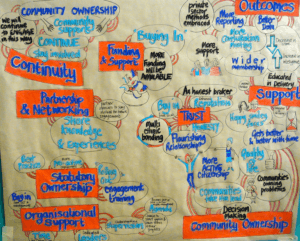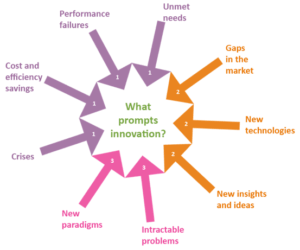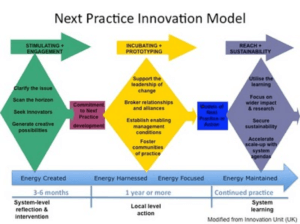
PCCs and Innovation: Innovating for Better Community Engagement

This blog builds on the learning from the MutualGain networked learning and support programme which has been tested in two police forces – one large and one small.
The visual above captures emerging themes from cohorts when asked what would need to happen to police with, by and for communities: what would policing look like in a modern world if the Peelian principle of “Police are the public and the public are the police” was to be realized?
I have just spent three days in Sweden at a Democracy Summit where we have been discussing the future of democracy, and how we reconnect the personal with the political. PCCs must hold our practitioners to account and ensure they are equipped to deliver a new, innovative approach to public service delivery. It’s not easy and you can’t legislate for it – you have to learn new skills and practice them, then embed the learning into the core business so that a new approach to policing can be developed.
The big challenge for PCCs is how they ensure the police build socially connected citizens who create their own social capital and value the democratic space they inhabit. By bringing the state and the individual together within a democratic social space we might bring politics and policing closer to those who feel marginalized and disengaged.
Building social capital achieves more than financial efficiencies. It creates places that feel safe, supportive and connected. Rosenfeld et al (2001) found that social capital had a significant effect on homicide rates, net of other predictors, while the unemployment and age composition of population had no effect. Coleman showed that social capital wasn’t limited to the networks of the powerful, but ‘conveyed real benefits to the poor and marginalised’ (Field 2010: p23).
How do services engage with those they need to so that they improve social policy and enable the PCC and the wider public to hold the police to account? How do we build a new set of ‘norms’ that might strengthen trust and relationships so that PCCs encourage a lively exchange of meaningful dialogue resulting in social policy and public services that genuinely help the vulnerable?
MutualGain’s experience of working with police has demonstrated that when you conduct meaningful community engagement you disrupt the existing system: often what is needed can’t be responded to within the existing structures and systems. Despite the goodwill and energy, those on and off our programme experience practical dilemmas and conflicting voices around the following themes:
- Communities are perceived to be in ‘deficit’ rather than viewed as rich in assets so we try to ‘fix’ them instead of unleashing their resources
- Command structures often put community engagement activity in the ‘nice to do’ or ‘if we have time’ box and when it is done it tends to be delivered in task-finish mode with little reflection or learning
- There is a narrative that communities are the answer to the problem, but practice prohibits it being done meaningfully as continued practice (not a project)
- Even when a meaningful project is commissioned, it isn’t prototyped – there is limited commitment to a ‘beta’ version because of a cultural fear about thinking aloud
- The force says tackle burglary but burglary isn’t the ‘real’ problem – who owns the ‘drugs’ and ‘mental health’ agenda?
- Police own the Organised Crime agenda, but it can’t be tackled without communities and partners, yet partnership working on community engagement remains inconsistent
- Existing models of community engagement are about ‘telling’ not ‘listening’. Activity isn’t captured, codified and analysed to influence the ‘system’ – instead community engagement equates to fun days, roadshows etc.
- Devolved decision making doesn’t always allow discretion in the command structure
- Community engagement myths continue to be believed[1] leading to weak models of engagement
Prompts for Innovation
The NESTA visual below shows that the police have most of the prompts to make innovation crucial for future delivery. The language has changed, transformation programmes designed, but now they need to invest in new practice.

Looked at closely, innovation nearly always comprises a long history of incremental steps. Getting to a moment of startling insight or a great idea usually requires a lot of patient development work – trial and error, false starts, dead ends and trips back to the drawing board to re-work your plans. (NESTA 2012. My emphasis)
Neighbourhood Policing and its variations of co located/partnership teams, roadshows, pledges, neighbourhood agreements, PACT meetings, surveys, fun days, neighbourhood watch, clean up days etc are all incremental steps to give community engagement its rightful place in service delivery.
Those steps document a series of dead ends and false starts which didn’t quite connect and mobilise the community in the way that was perhaps first intended. Ultimately the approaches didn’t enable police to help build social capital at a scale that enables them to reduce demand on services.

Community Engagement as Continued Practice
Empowering those closest to the community to unleash the assets in communities is not the ‘soft fluffy stuff’ of policing – quite the contrary, it has proved to be the tough, challenging, and disruptive stuff of policing.
If we use the Innovation Unit’s model for innovation we are a long way off meaningful community engagement being the ‘continued practice’ of policing. Cooperation and meaningful dialogue is imperative for a future British policing service. As services across England and Wales prepare for the real financial pain in 2016/7 they will need to think beyond ‘task-finish’ cultures to a networked and asset based culture. There is little point in embarking on meaningful community engagement without being prepared to listen to what emerges and investing in new initiatives. Or to orate grand statements of empowering the frontline if there is no will to seriously consider stopping some of the more traditional methods of engagement. If the police service were a business, it would ensure community understanding, insight and assets were the route to a more profitable society. PCCs are well placed to encourage better forms of dialogue, and it could even be a vote winner!
[1] (see http://www.involve.org.uk/blog/2013/02/26/from-fairy-tale-to-reality)
